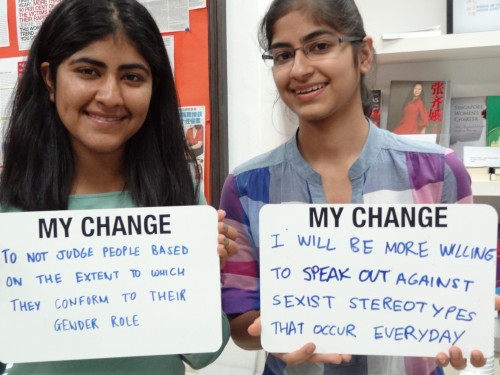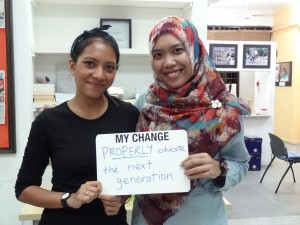by Ian Mak, Change Maker
[two_third]
 “The youth of today and the youth of tomorrow will be accorded an almost unequal opportunity for great accomplishment and human service.” – Dr Nicholas Murray
“The youth of today and the youth of tomorrow will be accorded an almost unequal opportunity for great accomplishment and human service.” – Dr Nicholas Murray
It is often tempting as a young person to discount our power to make change. We tend to ignore daunting social problems, believing that we do not have the ability to do anything about it. “Anyway,” we think, “adults can do it better.”
Wrong. Youth have tremendous potential and more importantly, the unique opportunity to make a significant difference in forwarding social causes. In the days of our youth is when many of our beliefs and worldviews are solidified. If we take the effort to question and rethink the social norms and practices around us, especially where they are problematic, we will be able to make a significant breakthrough in advancing social progress. This is because, through a critical enquiry of the traditions and cultural attitudes we grow up in, we discover new ways of being and doing things that can be better for social living.
This is particularly true in the case of violence against women. Over the years, violence against women in societies around the world hasn’t reduced – in fact, it has increased. Violence against women isn’t about a random nutter of a husband abusing his wife. It’s about outmoded concepts of masculinity. It’s about the normalisation of men using violence against women to retain and reproduce power. It’s about the silence from friends and family members who ensure that such violence goes unreported, and, therefore, excused. It is, fundamentally, about the social tolerance of women’s suffering.
We can do better than that. Every generation has the power to shape its own beliefs. We can do this by interrogating the past and reimagining the future. To start with, we need to examine existing social norms that allow violence against women to occur and go unreported.
One idea that really needs to be reconsidered is the prevailing notion of masculinity. Through redefining masculinity, we can change the attitude of men towards women and towards each other. We must know, and let other men know, that to be masculine is not to be violent and dominant over women or other men.
Social progress is often only made when people come together to take a stand. Think of Martin Luther King’s civil rights movement and of Gandhi’s civil disobedience against the British monopoly of the salt trade. Youth in Singapore and across the world making a commitment not to tolerate violence against women would send out a powerful message to everyone. It would tell people that society is moving forward and that we, this generation, will not excuse violence, will not accept inequality and oppression.
It is not going to be easy. Familial constructs across the world designate men as the head of the household, allowing for men to be considered as superior and more powerful. On the flip side, the same familial constructs prescribe that women should be submissive, subordinate, sacrificial and silent in the face of violence because it is their responsibility to keep the family together at all costs. As a result, women find it difficult to report violence, for fear of stigma and societal condemnation.
The youth can play a significant role in reshaping gender relations, starting with our own attitudes and the relationships in our lives. We can also act as change makers on the ground by interrupting a friend who makes a sexist joke or gently pointing out to a couple that their relationship is unequal. Most importantly, for young men, we can collectively redefine our view of masculinity as one that does not condone violence against women.
These actions may be small individually, but if everyone makes an effort, we can make real progress towards ending violence against women.
[/two_third]
[one_third last=last]
[/one_third]


